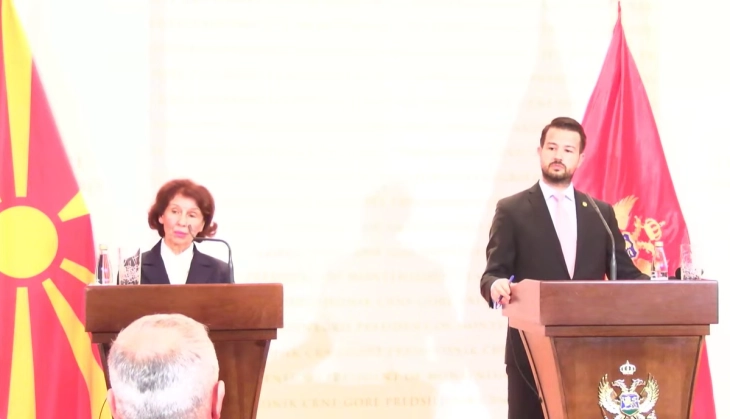Siljanovska Davkova: If we allow veto to persist, even most successful ones may face it at some point
- President Gordana Siljanovska Davkova paying an official visit to Podgorica commented on yesterday's statement by newly elected European Commissioner for Enlargement Marta Kos on the constitutional changes required from the country to move forward in its EU integration. Siljanovska Davkova said the wording by Kos was "bureaucratic," MIA reports from Podgorica.

Podgorica, 28 November 2024 (MIA) — President Gordana Siljanovska Davkova paying an official visit to Podgorica commented on yesterday's statement by newly elected European Commissioner for Enlargement Marta Kos on the constitutional changes required from the country to move forward in its EU integration. Siljanovska Davkova said the wording by Kos was "bureaucratic," MIA reports from Podgorica.
The President reiterated that in search of a win-win situation "we will take that step, too, but with a delayed legal effect."
"I rarely comment on others' comments and especially not abroad. I remember when Mr. Helmut Kohl said, 'I respond to interior questions at home', but I will respond to you. I honestly mind the diction of the new European Commissioner, because when she said, 'nothing less and nothing more', that did not sound to me like philosophy, or something that is known, take it or leave it. That sounded to me like sophisticated Euro-Mandarinism, and I am afraid of that diction that means direct interference in internal affairs," President Siljanovska Davkova said in response to a journalist's question at a joint press conference held with her Montenegrin counterpart, Jakov Milatovic, in Podgorica on Thursday.
Siljanovska Davkova said she would have understood if it were a recommendation, "but to say that 'you must do this' means the EU has an approach that I call bureaucratic."
"The EU is not a bureaucratic machine; it is more than that, as Mr. Macron said -- it is a philosophy based on principles and values, so let me, too, be a little pragmatic," she said, adding that she expected EU member states "to treat everyone with moderation and respect."
She also noted that the country had always been cooperative on the path to the EU and made compromises to its own detriment.
"First, in the Friendship and Good Neighborly Agreement with Bulgaria — since I keep hearing, every day, that 'pacta sunt servanda' — there is not a single word about constitutional amendments. They are mentioned in Protocol No. 2, in Article 3 or now in the Negotiating Framework, and in the conclusions the term 'protocol' is no longer used; the term 'minutes' is used. I argue that a protocol cannot be a source of constitutional law, nor of any law, nor can the minutes be, but here in the search for a win-win solution, we are saying we will take that step, too, but with a delayed legal effect," Siljanovska Davkova said.
The head of state recalled that the preamble of the Friendship Treaty said Bulgaria would "support and encourage Macedonia on its path to the EU."
"Let's give this a chance because I argue that if we allow the veto to persist, even the most successful ones in the process, toward the end, may face a veto. This really devalues the philosophy of European integration," she said.
"Let me repeat: If the lady with her speech was fishing for votes and said this with this kind of diction, now that she has been elected, it would be good for her to remember the region and measure her words, and act differently from other EU members, because she knows better than them," Siljanovska Davkova said.
The new European Commissioner for Enlargement, Marta Kos, in a media statement on Wednesday, following the approval of the new European Commission, said she expected North Macedonia to change the Constitution, because, as she pointed out, that was something the European Union was counting on, MIA reported from Strasbourg.
"It is something that we are counting on. Nothing less, nothing more. I believe that this is possible, and after that we can really accelerate the process," Kos said.
Asked whether the EU could guarantee that there would be no other vetoes afterward, Kos said she was not the one who could answer that question.
On how the problem with Bulgaria could be solved, Kos encouraged dialogue.
"We have to show that it is in our hands how we will solve the bilateral problems. Without this, and of course, following the EU values, we will not be able, on both sides, to do what’s the best for the European Union and, of course, what’s best for North Macedonia," Kos said. mr/







